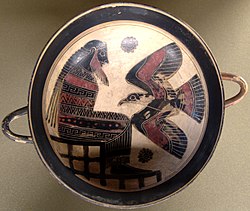Apella
| Sparta |
 Zeus on his throne with his eagle This article is part of the series: |
|
Great Rhetra Laws of Lycurgus Politeia |
|---|
|
List of Kings of Sparta Gerousia Ephorate Apella of the Damos Spartiates Perioeci Helots Agoge Syssitia |
|
Spartan army • Other Greek city-states • |
This article is part of the series:
Spartan Constitution
The Apella (Greek: Ἀπέλλα) was the popular deliberative assembly in the Ancient Greek city-state of Sparta, corresponding to the ecclesia in most other Greek states. Every Spartan male full citizen who had completed his thirtieth year was entitled to attend the meetings, which, according to Lycurgus' ordinance, must be held at the time of each full moon within the boundaries of Sparta.
The word is derived from the Doric word apella (ἀπέλλα), which originally meant wall, fence for animals and later assembly of people within the limits of the square. The explanation is given by Hesychius: apellai (ἀπέλλαι), sekoi (σηκοί "folds"), ecclesiai (ἐκκλησίαι: popular assemblies). The festival apellai was surely dedicated to the god Apollo (Doric form: Ἀπέλλων) and it was spread by the Dorians in central-Greece, as it is proved by the use of the month Apellaios (Ἀπέλλαιος).
The meetings had in all probability taken place originally in the Agora, but were later transferred to the neighbouring building known as the Skias. According to Plutarch, a Great Rhetra was given by Pythia to Lycurgus. The old aristocratic council, was substituted by the gerousia (thirty elders including the two kings). The meetings of the "apella" should take place from time to time, and the citizents should have the power to debate and take the decisions. This right of the citizents was very soon limited. The kings Theopompus and Polydorus, probably during the 7th century BC, added to the "rhetra" that the kings and the elders (gerousia) could set aside any "crooked" decision of the people.
...
Wikipedia
